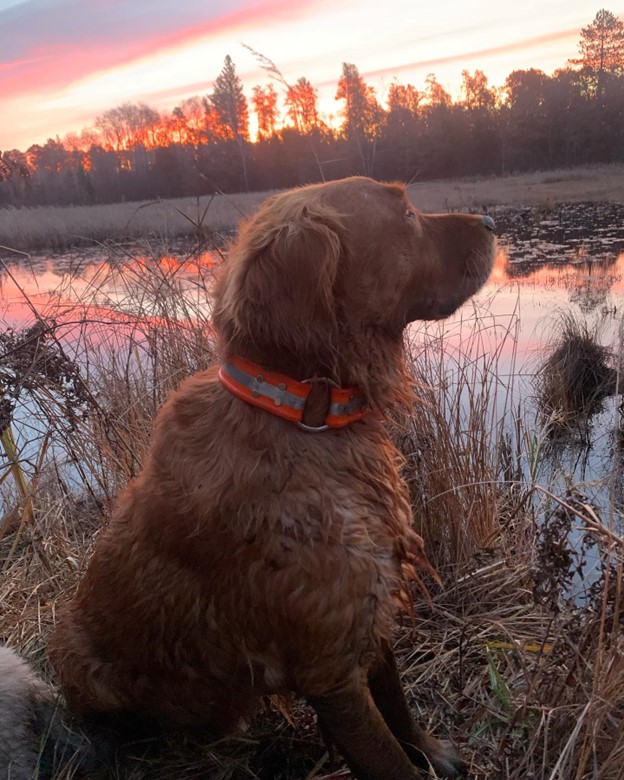Help Good Dogs Stop Bad Pests
Migratory bird hunters can help protect Wisconsin’s natural resources from aquatic invasive species this fall.
True friends don’t let their friends transport aquatic invasive species.
These invaders can hide in the most unsuspected places, so it’s important to double-check your gear (and your dog!) when you’re done hunting for the day.
When waterfowl hunting, insects, snails and seeds can collect under the vests of our four-legged friends. That’s why it’s important to give your dog a rinse with a jug of clean water or scrub them off with a brush while they go for a quick swim to prevent invasive species from hitching a ride home or to your next hunting spot.
Just a few minutes of preventative action can protect our hunting tradition for generations to come. Before launching into or leaving a water body, hunters should always:
- Inspect waders, boats, trailers, motors and hunting equipment, including boots, blinds and dogs, before leaving a boat launch or access point.
- Remove all plants, animals and mud to the best of your ability. A special consideration for waterfowl hunters is to remove all seed heads and roots when using vegetation to conceal duck blinds. It is also important to note that it is illegal to use phragmites for camouflage in counties where the plant is prohibited by NR40. In general, these counties include the western half of the state.
- Drain all water from decoys, boats, motors and other hunting equipment.
- Never move plants or live fish away from a water body.
| Make The Most Of The Season With The Wisconsin Natural Resources Magazine
Not sure how to make the most of fall in Wisconsin? Let the newest issue of the Wisconsin Natural Resources magazine be your guide.
Cool nights and changing colors can be a sign of many things, but in Green Bay, it means football season is here. Pair your football tailgate with exciting outdoor adventures and explore everything northeast Wisconsin has to offer with the story “Falling for Green Bay.”
As dusk continues to come earlier, some of Wisconsin’s nocturnal wildlife are getting more active. Learn about some of our state’s most notorious critters in “Animals of the night.”
The digital edition of Wisconsin Natural Resources is available now at wnrmag.com. To get the print edition, subscribe online or call 1-800-678-9472. You also can renew a subscription or give the magazine as a gift to friends and family today. |
Help Pass On Wisconsin’s Hunting Tradition
The DNR is now accepting applications for its Hunter Recruitment, Retention and Reactivation (R3) grant program. Funding from the grant program is used to help grow the number of hunters in Wisconsin and support novices who want to learn to hunt.
The Hunter R3 grant funds projects that teach people the skills, knowledge and attitudes to be responsible and safe hunters; provide instruction in safe firearm operations, ethics, game laws, outdoor survival and first aid; and focus on hunter and recreational shooter recruitment and retention.
A total grant pool of $125,000 is available. Individual grant awards are normally limited to $25,000. Cost-sharing funds can be awarded to individuals or community-based organizations, Wisconsin tribes, universities and schools.
Past grant recipient projects include:
- Archery range upgrades for urban after-school clubs
- Support for hunting-related expos focused on new audiences
- Learn-To-Hunt programs
- The purchase of outdoor wheelchairs for public use
Find more information about applying, eligible items and resources on the DNR’s Hunter R3 Grant Program webpage. |
|
